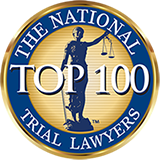Fraud is Big Business
Fraud on the government is an enormous problem representing 3.8% to 8.5% of all federal spending. In April of this year, the Government Accountability Office (GAO) issued a report which estimates that, based on data gathered between 2018 and 2022, the federal government is losing $233-521 billion per year to fraud. In other words, the low-side estimate of fraud on the federal government is roughly equal to the GDP of Greece and on the high side is enough to buy every household in the Pittsburgh metro area TWO median priced homes. Or, in terms of federal spending, there is more fraud than there is spending on any one of the following categories: veterans, transportation, food & agriculture, education, international affairs, housing, energy, and science, and more than many of those categories combined.
What is the FCA?
The Federal False Claims Act (FCA) remains the government’s best tool to combat fraud. The FCA provides for treble damages, plus civil penalties that are indexed to inflation, and mandatory payment of Plaintiff’s attorney’s fees and costs. FCA recoveries increased to $2.33 billion in fiscal year 2023, the most recent year for which we have data. FY23 also had the highest number of settlements and judgements in a single year. Since the 1986 amendments, the FCA has returned more than $75 billion in misspent funds to the Federal fisc. Healthcare fraud remains the largest category of recoveries but there was a large increase in defense spending fraud recoveries including $377 million from a single case against Booze Allen Hamilton.
The FCA permits whistleblowers to file cases in the name of the government and then participate in the ensuing litigation and recoveries. The law also includes a robust anti-retaliation provision which protects preparation for and participation in FCA cases as well as attempts to stop violations of the act. Importantly, FCA retaliation cases can succeed even where a putative whistleblower is unable to prove the underlying fraud.
Whistleblower cases are also on the rise. FY23 saw the highest number of qui tam cases filed since 2014 and we are on track to substantially best that figure this year. One cause of the increase is the tremendous volume of COVID relief fraud still being uncovered, investigated, and litigated. Congress passed a special 10-year statute of limitations for COVID relief fraud cases, so we anticipate the increased pace of filing to continue for some time.
The Small Business Administration (SBA) alone disbursed $1.2 trillion in COVID-19 Economic Injury Disaster Loan (EIDL) and Paycheck Protection Program (PPP) funds. In 2023, the SBA Office of Inspector General estimated $200 billion or 17% of SBA disbursed COVID funds were fraudulently obtained. The feeling on the ground, however, is that the figure is meaningfully higher. Just this year, we resolved PPP loan fraud cases that returned nearly $5 million to the federal government and have over $200 million in pending sealed PPP loan fraud and non-loan COVID fraud cases with more on the way.
How to Find a Case
All too often, potential whistleblowers only seek legal assistance after they try internally reporting or stopping fraud and suffer retaliation. Still, not every adverse employment action is the result of retaliation and not all jilted employees have viable FCA cases. At the most basic level, a viable FCA complaint must connect a lie to a federal dollar. For better or worse, federal spending reaches almost every part of the domestic economy and attenuation is no defense. Monies that originated with the federal government and passed through state or local government, private grant making bodies, or a nested set of subcontractors still “counts” as a federal dollar for FCA purposes.
It is of course a little more complicated. FCA complaints (but not retaliation) must meet Rule 9(b) which requires pleading fraud with particularity though what that means in practice differs Circuit to Circuit. The violations must be “material” and while there is no need to prove intent to defraud, the bad acts must have been committed at least recklessly.
Still, it is worth asking potential clients if the company does business directly or indirectly with the government. It is reasonably rare for fraudsters to carefully avoid defrauding the government. In fact, in the healthcare space it seems more likely that choosey bad actors will direct their fraud only at the government to avoid raising the ire of private insurers.
Grabbing the Tiger by the Tail
The pre-suit collection of supporting evidence might require interaction with HIPAA (there’s a carveout), Trade Secrets (there’s a carveout), RPC 4.2 relating to communications with a represented party (never as restrictive as Defendants claim but different state to state), privilege issues (incredibly important to screen), and the first-to-file rule, but it is a minefield that must be navigated. The distinction between pre-suit notification to the government and post-suit disclosure of all material evidence is, surprisingly, an evolving area of law. Maintenance of the statutory seal and coordination and cooperation with federal (and sometimes state) prosecutors and investigative and law enforcement agencies is mandatory.
It is possible to plead a personal retaliation case simultaneously with a qui tam but demand letters and pre-suit settlements present a thicket of problems that can be difficult or impossible to unravel after the fact and might doom an otherwise meritorious qui tam.
The best and safest path forward is to contact an experienced FCA litigator for advice and assistance before taking action. Most experienced FCA lawyers are happy to help other lawyers and potential clients issue spot and make informed choices about whether and how to proceed. Whether intentionally or as an artifact of the relatively niche practice area, FCA lawyers are accustomed to working in multi-firm teams.
Fraud against the government is sadly likely to continue but the government, along with whistleblowers and their lawyers, have the tools to hold at least some fraudsters to account.
Darth M. Newman represents whistleblowers and litigates complex commercial disputes across the country. He is also a Mediator and Early Neutral Evaluator. He can be reached at [email protected] or 412










